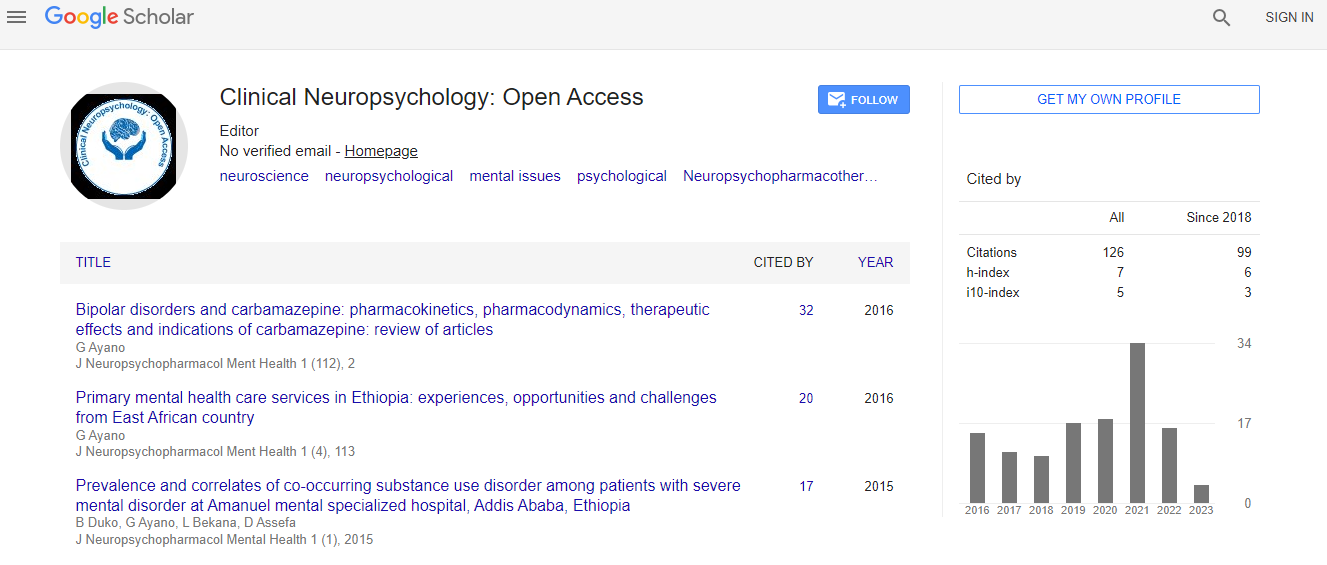Our Group organises 3000+ Global Conferenceseries Events every year across USA, Europe & Asia with support from 1000 more scientific Societies and Publishes 700+ Open Access Journals which contains over 50000 eminent personalities, reputed scientists as editorial board members.
Open Access Journals gaining more Readers and Citations
700 Journals and 15,000,000 Readers Each Journal is getting 25,000+ Readers
Google Scholar citation report
Citations : 141
Clinical Neuropsychology: Open Access received 141 citations as per Google Scholar report
Indexed In
- Google Scholar
- RefSeek
- Hamdard University
- EBSCO A-Z
- OCLC- WorldCat
Useful Links
Recommended Journals
Related Subjects
Share This Page
The neuroprotective effect of glutamate receptors group II agonists in an animal model of birth asphyxia is connected with inhibition of caspase independent apoptosis
8th Global Experts Meeting on Advances in Neurology and Neuropsychiatry
Ewelina Bratek, A Ziembowicz and E Salinska
Mossakowski Medical Research Centre-Polish Academy of Sciences, Poland
Posters & Accepted Abstracts: ClinNeuropsychol
Abstract
Statement of the Problem: Hypoxic-ischemic encephalopathy is one of the leading causes of neonatal mortality and permanent neurological disability worldwide. It was shown recently that mGluR2/3 activation before or after ischemic insult results in neuroprotection, but the exact mechanism of this effect is not clear. Aim: The aim of present study was to investigate whether glutamate receptors group II agonists (mGluR2/3) activation after hypoxia-ischemia reduces brain damage and inhibits apoptotic processes. Methodology: We used an animal model of Hypoxia-Ischemia (H-I) on 7-day old rat pups. Animals underwent unilateral common carotid artery ligation combined with 75 min hypoxia at 7.4% oxygen. Control pups were sham-operated (anaesthetized and left common carotid artery dissected, but not ligated). Animals were injected intraperitoneally with mGluR2 (LY 379268) and mGluR3 (NAAG) agonists, 1 hour or 6 hours after H-I (5 mg/kg of body weight). We examined the weight deficit of the ischemic brain hemisphere and the expression of caspase independent apoptosis factors (AIF, HTR/OMI and endonuclease G). The expression of trophic factors GDNF, BDNF and TGF-beta was also measured. Results: Our results show that application of each agonist decreased brain tissue weight loss in ischemic hemisphere independently on the time of application (from 40% in H-I to 15-20% in treated). Both agonists of mGluR2/3 applied 1 hour or 6 hours after H-I decreased expression of AIF, HTR/OMI and endonuclease G proteins compared to untreated H-I. The mGluR2/3 agonists application decreased expression of TGF-beta and increased BDNF and GDNF in the ischemic hemisphere compared to H-I. Conclusion: This study demonstrated the neuroprotective effect of mGluR 2/3 agonists on neonatal hypoxic-ischemic brain injury. Presented data suggest that this effect is connected with decreasing apoptosis.Biography
Ewelina Bratek is PhD student in Dept. of Neurochem at Mossakowski Medical Research Centre, Polish Academy of Sciences, Warsaw, Poland. Ewelina Bratek has published more than 3 papers in reputed journals.
E-mail: ebratek@imdik.pan.pl

 Spanish
Spanish  Chinese
Chinese  Russian
Russian  German
German  French
French  Japanese
Japanese  Portuguese
Portuguese  Hindi
Hindi 